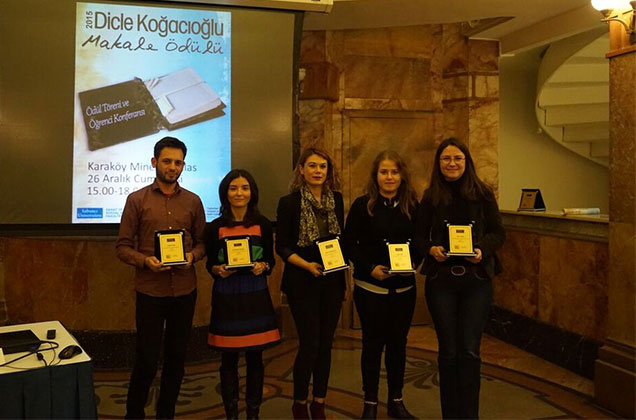12/01/2016
Established by the Sabancı University Faculty of Arts and Social Sciences and Gender and Women’s Studies Forum, the Dicle Koğacıoğlu Article Awards were presented on Saturday, December 26, 2015 at a ceremony following a student conference at the Minerva Palas in Karaköy.

This year's first prize went to Nisa Göksel from Northwestern University with her paper "Motherhood in an Alternative Political Sphere: Understanding the Political and Ethical Struggle of Mothers for Peace"; second prize to Caner Hazar from the University of Connecticut with his paper "Gender Performance as an Everyday Strategy in Turkey" and third prize to Çağlar Çetin with the paper "The Collective Failure of Men to Cope with Failure: Possible Strategies for Addressing the Issues and Shortcomings of Men's Organizations in Turkey That Oppose Gender Regimes."
In addition to the award winners, Arzu Maltaş Erol and Ferda Aşık from Karamanoğlu Mehmetbey University presented their paper "Women's Quest for a City: Experiences of Place in Anatolian Universities" and Hilal Kara from Middle East Technical University presented her paper "A Home Worker on the Road: Understanding the City from the Perspective of 'Housekeeping' Women."
Introductory remarks to the student conference and awards ceremony, held to encourage the work of young researchers on the society and culture of Turkey from a perspective of gender, were delivered by Sabancı University Faculty of Arts and Social Sciences Emeritus Professor Ayşe Öncü. Ayşe Öncü said that Dicle Koğacıoğlu was a student who left her mark. Öncü explained that the way Dicle Koğacıoğlu pushed the boundaries of academic work with activism was a precious endeavor. Öncü added that Koğacıoğlu was the first person to compile an ethnography of law. She said that it was thanks to Dicle Koğacıoğlu that she learned how law could become an area where gender equality is produced. Ayşe Öncü also remembered Ferhunde Özbay, who passed away in 2015. Öncü said that they would publish a collection of Dicle Koğacıoğlu Award winners in their memories.
Introductory remarks were followed by the first panel discussion moderated by Sabancı University Faculty of Arts and Social Sciences member Ayşe Öncü. Hilal Kara from Middle East Technical University presented her paper "A Home Worker on the Road: Understanding the City from the Perspective of 'Housekeeping' Women." Hilal Kara explained that, based on interviews with 32 housekeepers, there was coincidence between two important transitions of migrating from rural areas to the city, and entering the workforce. Kara said that more than half of the 32 women had begun working after 2000, and that the predominant motive for the women to work was sending their children to school. Hilal Kara mentioned that none of the interviewees expressed a wish to live anywhere other than their current neighborhood and that they continued their rural practices in the same manner.
The second panelist of the first session was Arzu Maltaş Erol from Karamanoğlu Mehmetbey University. Arzu Maltaş Erol spoke on the paper titled "Women's Quest for a City: Experiences of Place in Anatolian Universities" coauthored with Ferda Aşık. Arzu Maltaş Erol said that their paper was based on the expansion of universities across Anatolian provinces. She explained that the concept of space, treated from geographical and mathematical standpoints, changed in the 19th century. Discussing the urban space as the foundation of their paper, Erol said that the urban space was important as an environment for gender role production. Arzu Maltaş Erol argued that urban spaces were masculine and that women were condemned to the private sphere. Arzu Maltaş Erol said that they interviewed 15 women attending university, whose main concerns were attire and getting around in the city.
The moderator of the second panel discussion was Sabancı University Faculty of Arts and Social Sciences Professor Ayşe Betül Çelik. Caner Hazar from the University of Connecticut spoke on his paper "Gender Performance as an Everyday Strategy in Turkey." Caner Hazar said that his article discussed perceptions of male homosexuality in Turkey. He argued that the nation-state portrayed women as the "better half" of men, and discussed the indifference of the state to honor killings and the refusal to view the active partner in a couple as homosexual. Explaining the invisibility of male homosexuality in Turkey, Caner Hazar said that homosexual men used the rigid notion of manhood in the society to their own advantage, benefiting from the historical opposition of men and women.
The second panelist was Nisa Göksel from Northwestern University. Göksel presented her paper "Motherhood in an Alternative Political Sphere: Understanding the Political and Ethical Struggle of Mothers for Peace." Nisa Göksel discussed the effect of street demonstrations that transformed motherhood into the role of a local peace ambassador. Göksel explained the contradiction that arises from being both ethical and political, and said that mothers were also embroiled in a struggle against the political government and their own ethnic groups. Göksel emphasized that women developed a discourse as an alternative to the moralist discourse of the state, and rejected the responsibility imposed on them by the state to stand up to be ambassadors of peace that was inclusive of the others Göksel said that motherhood extended beyond family ties to assume a role for the rebuilding of peace.





